New perspectives blossom in these spring books
I must confess that I was never a fan of spring growing up. Sure, I like that it’s no longer below zero, but the weather in spring isn’t all that great either, so it’s less “pro” and more “not-con.”
Spring may be the time for flowers and baby animals, but – be real with me – it’s usually just drab, gray skies and mud until the very end, when it’s practically already summer.
But as time goes on, I have started to find myself coming around to the idea more. I guess it’s impossible to be too upset when there’s finally sunshine outside and you can hear birds again.
So, spring, I’m sorry about what I may have said about you in the past. I hope this list of spring books makes up for all of it.
Memoirs
Memoirs are a controversial bunch. Some people love them, some people hate them. Because they often reflect on past hardships, it can be difficult for the author to balance directly telling the reader their opinions and not sounding like they are preaching to the audience. However, the nature of both looking back at hard times and knowing that the future is full of hope is also what makes these stories perfect for spring.
In the Dream House by Carmen Maria Machado
Goodreads Description: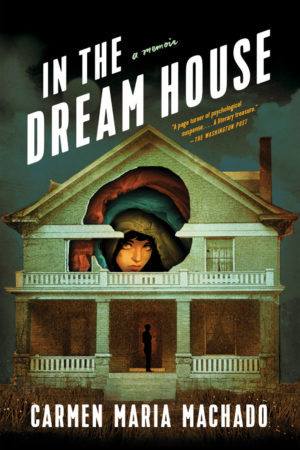
For years Carmen Maria Machado has struggled to articulate her experiences in an abusive same-sex relationship. In this extraordinarily candid and radically inventive memoir, Machado tackles a dark and difficult subject with wit, inventiveness and an inquiring spirit, as she uses a series of narrative tropes—including classic horror themes—to create an entirely unique piece of work which is destined to become an instant classic.
If you are interested in experimental books, this is a book you may want to check out. In In the Dream House by Carmen Maria Machado, each chapter compares different parts of the author’s life to various tropes or genres, such as “self-help bestseller” or “murder mystery.”
I find that the problem with memoirs is that they’re not always written by people who have a lot of experience with writing. That’s not to say that they’re always bad, but it does put memoir authors at a bit of a disadvantage. However, In the Dream House is the kind of book that is clearly written by someone who lives and breathes stories.
For Machado, stories aren’t just a hobby, they are how she is able to view and process her own life, and this could be why she chooses to write this book in the way that she does.
The effect of her writing is hard to describe. It is incredibly vulnerable, in the same way that being in a sterile, white doctor’s office is vulnerable. It is an interactive experience, in the same way that screaming at a character in a horror movie to “stop” is interactive. It is personal, in the same way that finding something that applies to yourself in the pages of a psychology textbook is personal.
In other words, Machado manages to write in a way that is both personal and distant, and she does this by interspersing her story with analyses of popular media, feminism, and queer theory. Her knowledge of and passion for these topics shows through. These are not random musings. They are carefully written, complete with footnotes, and impactful even apart from the rest of the story.
Of course, her analyses are another way for her to examine her personal experience because sometimes the only way to look in is to look out. Furthermore, the somewhat clinical and removed perspective helps her truly vulnerable moments be even more heart-wrenching and also demonstrates how her experience is not an isolated issue but a pattern caused by larger issues.
At this point, this book might sound a bit intimidating. At least, it did to me, as I am used to straightforward and linear stories with much simpler structures, but it was surprisingly not. My doubts also came, in part, because I had trouble reading some of Machado’s other books, but this one was not nearly as hard to digest. In fact, it guides the reader through in a way that helps you feel like you can understand even the strange and experimental parts.
And boy, can it get weird at points. One of my favorite chapters is told as a “choose your own adventure” game. The reader would be presented with a scenario and would have to choose how to react. If they chose one option, they would be instructed to turn to one page. If they chose the other, then they would go to a different page.
Despite how strange this sounds, it never felt like a gimmick. For me, at least, it felt so unbearably raw and true, because it was always used to strategically emphasize the themes and emotions— in this case, how there was never a “right” decision. For that reason, this is a book that I really enjoyed and one that I would highly recommend.
Romance
Do I really need to explain why romance books and spring just make sense together? I don’t think so.
Lovely War by Julie Berry
Goodreads description: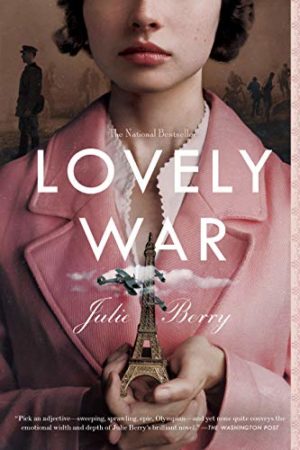
It’s 1917, and World War I is at its zenith when Hazel and James first catch sight of each other at a London party. She’s a shy and talented pianist; he’s a newly minted soldier with dreams of becoming an architect. When they fall in love, it’s immediate and deep – and cut short when James is shipped off to the killing fields.
Aubrey Edwards is also headed toward the trenches. A gifted musician who’s played Carnegie Hall, he’s a member of the 15th New York Infantry, an all-African-American regiment being sent to Europe to help end the Great War. Love is the last thing on his mind. But that’s before he meets Colette Fournier, a Belgian chanteuse who’s already survived unspeakable tragedy at the hands of the Germans.
Thirty years after these four lovers’ fates collide, the Greek goddess Aphrodite tells their stories to her husband, Hephaestus, and her lover, Ares, in a luxe Manhattan hotel room at the height of World War II. She seeks to answer the age-old question: Why are Love and War eternally drawn to one another? But her quest for a conclusion that will satisfy her jealous husband uncovers a multi-threaded tale of prejudice, trauma, and music and reveals that War is no match for the power of Love.
Sometimes, a gimmick is just a gimmick. This is certainly true with Lovely War by Julie Berry. Lovely War promises a fairly standard and inoffensive romance, but what sets it apart is that the book is narrated by Aphrodite, the goddess of love, after she is caught and put on “trial” for having an affair. However, Berry fails to capture the potential of such a unique perspective, and the greek gods in this story manage to both overstay and understay their welcome.
The stories of Hazel, James, Aubrey, and Colette, are all fairly compelling, as the author does a good job of establishing why the characters work well together.
The idea behind the narration is also very compelling. It is told by Aphrodite, but other gods jump in whenever a section of the story is especially relevant to their role in the pantheon. For example, Apollo might narrate when Aubrey experiments with his music, and Hades might narrate when a character is close to death. I really enjoyed this choice, as it served to emphasize the tone of each chapter. What I didn’t like as much, though, was the “subplot” chapters, which interrupted the main storyline with Aphrodite’s trial and descriptions of the other god’s reactions to the story.
My frustration with these parts is that they failed to move the story forward or provide meaningful insight into the gods and the story. Worse, though, was how these parts seemed to condescend to the reader. In many instances, Ares or some other god would call the story boring only for Aphrodite to lecture them about how love is actually “super great.” It was as if the author was anticipating the reader to dismiss the story and decided to directly debunk their criticism. However, I assume that most people reading romance books do so because they want to read romance, so this was unnecessary. In my opinion, these sections might have been less annoying had they been either significantly cut down or if they were used to bookend the story so that it was contained to one section at the very beginning and another at the very end.
Although the gods’ sections were intrusive in certain ways, they also were not intrusive enough in other ways. Despite her involvement throughout the story, Aphrodite completely bypasses any discussion or even hints toward her own insecurities and fears, only revealing them at the very end. I get the feeling that Aphrodite’s desires were supposed to be hidden from the reader until the end but “Surprise, this character has actual thoughts and emotions!” is kind of a cheap twist.
That being said, the main storyline was still enjoyable with the exception of the aforementioned interruptions. Hazel and James fall in love quickly, but I didn’t actually mind this because to me their story was more about being in love rather than just falling in love. I was more drawn to Aubrey and Colette, though, whose vibrant personalities complement each other well.
Overall, I had a good time reading it and wouldn’t consider it a waste of time, even though I think that the book had a lot of potential that it didn’t live up to and could have benefited from some heavy editing.
Hani and Ishu’s Guide to Fake Dating by Adiba Jaigirdar
Goodreads description: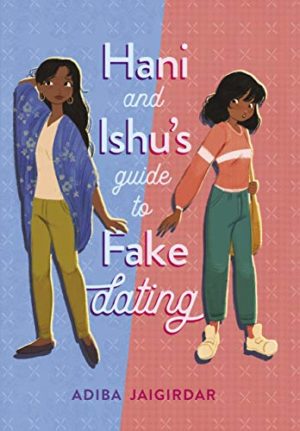
Everyone likes Humaira “Hani” Khan—she’s easy going and one of the most popular girls at school. But when she comes out to her friends as bisexual, they invalidate her identity, saying she can’t be bi if she’s only dated guys. Panicked, Hani blurts out that she’s in a relationship…with a girl her friends absolutely hate—Ishita “Ishu” Dey. Ishu is the complete opposite of Hani. She’s an academic overachiever who hopes that becoming head girl will set her on the right track for college. But Ishita agrees to help Hani, if Hani will help her become more popular so that she stands a chance of being elected head girl.
Despite their mutually beneficial pact, they start developing real feelings for each other. But relationships are complicated, and some people will do anything to stop two Bengali girls from achieving happily ever after.
Hani and Ishu’s Guide to Fake Dating is tropey, cliche, and predictable, which just so happens to be everything that I want in a romcom. That being said, not all books get this right. It can actually be a pretty difficult balance, but in this book, Jaigirdar manages to pull it off.
Hani and Ishu don’t talk much at school, but they are very aware of each other’s existence, given the many Bengali parties they meet each other at. It’s a bit of an awkward dynamic, but it is something that feels true to life. Oftentimes, you don’t know how familiar to be with someone outside of the usual context, and I liked how this was portrayed in this book.
But once they get closer, it becomes clearer that they do make a great couple because the narration really explores why they work well together, despite being such different people. And underlying their sweet romance are stories of them navigating family, friends, and the pressures of fitting in.
The one thing that could have been improved was the lack of supportive side characters (other than their parents). This might be a personal thing, but I don’t really like when characters in a romance only have positive interactions with each other, while the rest of the world is forgotten.
Frankly, this book isn’t necessarily the most memorable story, but I don’t feel like it needs to be. It was something that I enjoyed reading in the moment, and I could see it being a comfort read for slumps when reading can feel like too much to deal with, and all that you want is something feel-good and easy.
Family
Spring is a time for love, and this most obviously points to romance books, but let’s not forget that there are other kinds of love, too. For example, familial.
Whether real or fictional, family can be complicated, and that means that there are all kinds of stories people can tell about families.
The Magic Fish by Trung Le Nguyen
Goodreads description: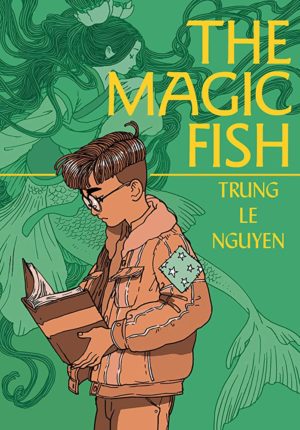
In fairy tales, the prince falls in love with the princess. But Tiến has a different story to tell. His parents are refugees struggling to learn English, and he doesn’t know how to come out to them in Vietnamese.
If he doesn’t even have the right words, how can he ever know if his parents will accept him?
The answer is in fairy tales— a language that Tiến and his parents share. Tiến learns from his favorite stories as he navigates the world with the help of friends, family, and fairy tales.
As the child of Asian immigrants, I have read quite a few stories by and about the children of Asian immigrants and, as a whole, I’ve really enjoyed them because they often explore complex and familiar family dynamics.
Frankly, though, I don’t always need stories about learning that “tough love” is still love and how complicated it can be when your parents try and fail to support you because they were raised differently, because that hasn’t been my entire experience. Sometimes, it is nice to take a break from books like On Earth We’re Briefly Gorgeous (a great memoir that I recommend but did not have the time nor space to include) and read something sweeter, like The Magic Fish by Trung Lee Nguyen.
The Magic Fish stands out to me because it demonstrates a kind of wholesomeness between parent and child that can be pretty uncommon in books of all genres. That’s not to say that there aren’t any struggles in their relationship, because there are. Communication is the main struggle, as Tiến is unsure of how to talk to his mom and she is often unsure of how to respond to him. However, they are both trying and willing to do the work to find a way for them to understand each other, which makes their relationship something that I am willing to root for.
Something that I wasn’t expecting from this book, however, was that the mother is as much a main character as Tiến is. She has her own plotline and her own struggles, which makes it really compelling because in similar stories I find that the parents are often treated as stagnant relics of their home countries rather than people who have adapted and continue to adapt to the people and situations that surround them.
Besides that, this comic is beautifully illustrated. It was mainly the beautiful drawings that drew me to this book to begin with. I don’t know too much about art, but I can say that the way the drawings flow across the page is wonderfully dynamic and the character designs are stunning. It’s a very short and quick read, but I was definitely slowed down by the fact that I kept lingering on each page so I could see every little detail.
Overall, this is a heartwarming story about two people who learn to understand each other, and I’m honestly just a sucker for genuinely supportive relationships with healthy communication.
Fairies
Fairies, Fae, Faeries, Fey, the Fair Folk— it seems silly to have so many words for one thing, but when you start to read books about them, you start to understand that this doesn’t just apply to the name, but this whole group of stories as a whole.
When you read stories about fairies, you may find them described as tiny, helpful creatures. Other times they might be described as gorgeous superhumans with elemental powers. The rest of the time, they could be barely humanoid monsters or mischievous tricksters or even well-oiled parts to some otherworldly and highly bureaucratic social system. Basically, nobody can agree on what they are.
The only thing that seems to stay consistent is that they have some kind of connection to the natural world. So despite how different these stories can be in tone, these books all bring out the varied and vibrant imagery that we associate with spring.
The Cruel Prince by Holly Black
Goodreads description: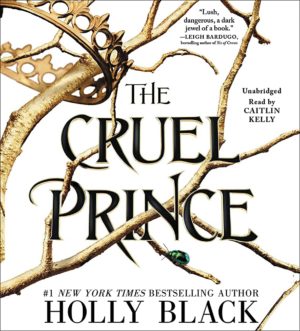
Jude was seven when her parents were murdered and she and her two sisters were stolen away to live in the treacherous High Court of Faerie. Ten years later, Jude wants nothing more than to belong there, despite her mortality. But many of the fey despise humans. Especially Prince Cardan, the youngest and wickedest son of the High King.
To win a place at the Court, she must defy him–and face the consequences.
As Jude becomes more deeply embroiled in palace intrigues and deceptions, she discovers her own capacity for trickery and bloodshed. But as betrayal threatens to drown the Courts of Faerie in violence, Jude will need to risk her life in a dangerous alliance to save her sisters, and Faerie itself.
Like I said earlier, there are many kinds of faerie stories, but I think The Cruel Prince by Holly Black embodies everything that I personally want to see in one.
Ethereal and lush, the faerie world, or just Faerie, in this is packed with images of splendor and hedonism that is undercut by a current of something violent— which only seems to make it more beautiful. Furthermore, it contrasts strikingly against the dull human world it describes, with its reheated dinners and cable TV. In Faerie, every apple tastes so much sweeter and every cut stings so much worse.
And the Faeries themselves are no different. In this, they are, as you might guess, cruel. At best, they are tricksters who revel in inflicting pain, and at worst they are abusive and bloodthirsty tyrants. Jude, in contrast, is a regular human, albeit one that was raised in Faerie and knows the intricacies of navigating it. That’s another thing that sets it apart from many other urban fantasy novels— the main character understands the “strange” world already, and to her it is our “normal” world that seems hazy and unfamiliar, which is a viewpoint that I haven’t really seen in many books.
But worldbuilding alone does not a story make. For me personally, characters are the most compelling part of a story, and I found that The Cruel Prince was lacking in this area. Jude, despite being presented as ruthless and ambitious, actually comes off as quite passive throughout most of the story. It feels like the plot just happens to her, rather than her moving it forward.
The Faerie characters also face issues with characterization. For the most part, they are schoolyard bullies given way too much power, which is fine except for when all of them act the same and it becomes hard to get invested in any of Jude’s relationships and to understand why she wants to belong with them.
But mostly, I think that her relationship with her sisters had the most potential. Both of them were very distinct from each other and had the potential to be very interesting. Despite being sisters, they often hold each other at arm’s length and have difficulty understanding one another, and I really enjoyed the snippets of their dynamics that I did see.
The book wraps up with what I think is a really great set up for the future installments, which is perhaps the saving grace, because although I found the middle to struggle due to the underdeveloped characters, it did start to pick up at the end with Jude becoming a more active character, which I hope to see more of.
I hope that you are able to find a good book to check out this spring! Come back soon for some summer book reviews.
